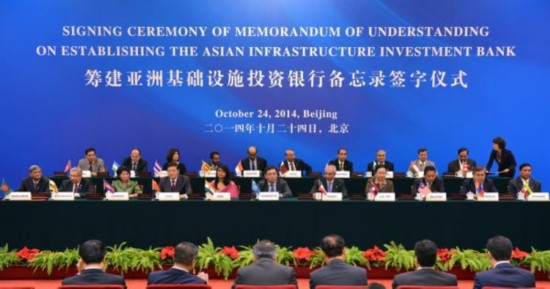

 |
| file photo |
Third, the AIIB has not been established on the basis of any ideology. Since the establishment of Vienna system, the West has been demonstrating cultural and regional prejudice against other regions. Terms such as Orientalism, the Asiatic mode of production and Oriental despotism are biased concepts, and the Cold War was a typical ideological war. Over the past century, the West has established a culturally biased world order. The World Bank, International Monetary Fund and even the ADB have provided funds and aid to countries on the basis of ideology. As a result, many developing countries have undergone change, but not for the better.
In contrast, the AIIB will provide funds and aid for development needs and to help build "a community of common destiny". China regards the AIIB as being complementary to the existing global financial system, and any valid reason the US sees it as a threat.
Fourth, the change that the AIIB is expected to bring about will be progressive. The influence of the bank on the financial world too will be different, for it will not have a severe impact on the existing global financial norms.
China has always written its own history and contributed to the world in its own way. From the Five Principles of Peaceful Coexistence of the Mao Zedong era to the Peace and Development Principle propounded by Deng Xiaoping for the reform and opening-up to the current principle of "a community of common destiny" advanced by President Xi Jinping and represented by the AIIB, the consistent core of China's policy has been peaceful coexistence. This unchangeable pursuit is supported by China's culture of harmony. And the AIIB reflects China's people-oriented world view.
The Chinese people know the Western rules of the game. But it is perhaps a bit difficult for the West, given their cultural bias, to understand Chinese people's civilizational norms. Through its long-term effective operation of global organizations, the AIIB can help achieve the goal of making the West do so.
 |
 J-11 fighters in air exercise
J-11 fighters in air exercise Beauties dancing on the rings
Beauties dancing on the rings Attendants-to-be join Mr. & Miss Campus Contest
Attendants-to-be join Mr. & Miss Campus Contest Beijing's toughest anti-smoking law takes effect
Beijing's toughest anti-smoking law takes effect Family lives in cave for about 50 years in SW China
Family lives in cave for about 50 years in SW China PLA soldiers operating vehicle-mounted guns in drill
PLA soldiers operating vehicle-mounted guns in drill Blind carpenter in E China's Jiangxi
Blind carpenter in E China's Jiangxi China hosts overseas disaster relief exercise for the first time
China hosts overseas disaster relief exercise for the first time 20 pairs of twins who will become flight attendants in Sichuan
20 pairs of twins who will become flight attendants in Sichuan Obama is sowing discontent in S.China Sea
Obama is sowing discontent in S.China Sea Rescuers work through night to reach cruise ship survivors
Rescuers work through night to reach cruise ship survivors Driving through limbo
Driving through limbo Facing down MERS
Facing down MERSDay|Week